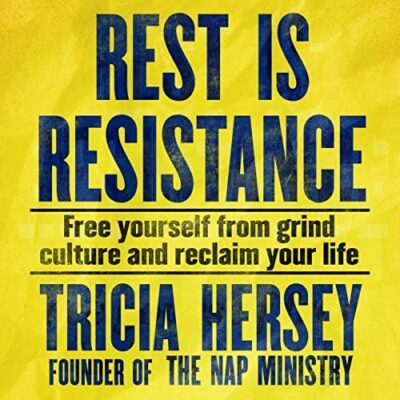In the years that I have been trying my best to avoid overwork, I’ve become more attuned to the signs that I am indeed overworking. I usually notice one of three things: an inability to slow my brain down and not think about work during my off-time, difficulty with problem-solving (where my brain becomes like an overloaded computer that can not longer manage complex tasks), or a bunch of migraines.
This past week, I had all three. And a lot of it was overwork for reasons I was excited about. I had developed this fantastic collaboration with a sociology instructor where we co-designed a research assignment and I then worked with all four of his classes. But it was at a time when I was busy with a lot of other work in my liaison areas as well as teaching the core classes (reading, writing, and communications) that we all teach and it was a class I’d never worked with before, so there was a lot of tinkering after each session to improve it for the next. Then there were a bunch of things I had to do as co-chair of the Oregon Library Association EDI and Antiracism Committee, plus responding to panicked emails from students in my liaison areas, plus a last-minute request from an instructor in another of my liaison areas asking for help with finding a new open textbook or library eBook, plus worrying about the upcoming class with the instructor everyone dreads teaching for who has not even bothered to respond to my two emails asking him for his assignment and, by Friday, I truly felt like my brain wasn’t working and I’d worked over 50 hours (our work week is normally 37). I spent Friday evening on the couch watching TV in a stupor and I don’t think I could have willed myself up if I’d tried.
Finally, on Sunday, I feel like I can think more clearly. I’ve spent the weekend resting and taking walks. Today, I was able to think up a simple solution to a problem that was totally eluding me on Friday. I mean, it is shocking when I think of how obvious the solution is and how completely and utterly useless I was to solve it on Friday. My brain was so full and so racing with all the things I had to do that I couldn’t think logically. I was so exhausted that I couldn’t do any of the household chores that needed doing over the weekend. The week’s work not only took time away from rest and loved ones on the weekdays, but it made me profoundly useless over the weekend. Doing ANYTHING (fun or productive) this weekend was an impossibility. I’m still so unbelievably tired as I get ready to start over again Monday morning.
Outreach is a big part of being a subject librarian/liaison librarian. Since I was a baby librarian, I was taught that our role is to promote to faculty the ways that we can help support their students. A great liaison builds strong relationships and collaborations with faculty. Never, ever, have I heard anyone address what to do if you were really successful and ended up with more work than you can handle. In fact, I believe I’ve heard people (maybe even me!) say “that would be a good problem to have.” Well, I have this problem now and I can tell you that it isn’t a good problem to have. It’s horrible. Too much of a good thing isn’t a good thing.
I liaise with seven different social science disciplines and each provides me with work on at least one (and sometimes many) of the following things 1) OER/streaming video licensing/textbook affordability work, 2) research tutorial creation, 3) embedding in online classes, 4) synchronous teaching, or 5) student consultations. Some of this work is predictable, but much of it is not. When I started at PCC, I went to department meetings a few times a year for each of my liaison areas and promoted the things I could do to support their teaching and their students’ learning. And at first things were slow. Maybe every other time, I’d get one faculty member interested in me teaching for them or who wanted to talk to me about open textbook adoption. But then, after 5-6 years of relationship-building, I got lots of interest. And while on one level it felt like a dream — all the sort of collaborations I’d hoped for — it became a nightmare. Because only I had the specialized subject knowledge to teach these classes or develop tutorials for them (truly, it took me four years to even understand what the students in the geography classes I worked with even needed). Students in some of the classes I worked with only felt comfortable working with me on their research, even if I told them over and over that all of my colleagues were lovely. And because my faculty have adopted library eBooks as textbooks (so students don’t have to buy textbooks) at greater rates than in other disciplines, when the publisher Wiley pulled thousands of eBooks from our collection (as well as the collections of other libraries), I was flattened by the workload of trying to find last-minute alternatives a week before classes started. Every other thing I had on my to-do list had to be pushed for that.
Last year, I stopped going to my liaison areas’ department meetings because I was so full-up on work and every meeting I went to led to at least one (and often more) collaborations. It was the only way I could stem the tide. And it wasn’t enough. One of my lovely colleagues, who is also a passionate outreacher, said it felt like we are essentially being punished for doing exactly what we’re supposed to do. No good deed goes unpunished. I’ve tried in the past to speak to my boss about my workload, but I’ve never received any concrete help or advice. I have a meeting with her this week and I plan to make some suggestions about how to decrease my workload because I’m truly at my breaking point. I can’t keep going like this. More to the point, I won’t.
I spent a lot of my career overworking to the kind of unhealthy extent that is currently breaking me. Truly, I don’t know now how I did it. I also really centered work in my life back then. I did that for a lot of reasons, but the biggest one was that I was trying to feel like I was worthy. Good enough. If I worked hard enough, did enough good things, I would finally not feel like a piece of shit. We do live in a society that treats busyness as a status symbol; a badge of honor. But I found that it didn’t matter how much I did or how many accolades or pats on the back I received — I never felt like I was enough. It took recognizing that I was good enough just as I was to break the spell of workaholism (though like most addictions, it’s easy to fall back into old habits). But it’s really true that the pace you set is the pace they expect, and it’s painfully hard to stay in the same job and try to claw back your life and well-being. That’s where I am now.
I’ve had to contend with a lot of guilt at letting go of things. Guilt for setting boundaries with students and faculty. Guilt for not doing things that people had come to rely on me for (but that weren’t requirements of my position specifically). I felt like I was letting my colleagues down by setting limits that nurtured my own well-being. Now they would have to do more because I was doing less. Or students would be less well-served because I wasn’t making myself as available as I used to for consultations. But I’ve come to feel very strongly over the past few years that it’s actually overwork that is doing our colleagues a disservice.
By overworking, we normalize overwork. We make overwork look like the norm so working the amount that your job description calls for becomes framed as “quiet quitting.” We might think we’re helping out colleagues by taking on such a huge load, but what we’re doing is making it look like we’re doing great work while our colleagues are a bunch of laggards. And we’re also erasing the impact of increased austerity. Our bosses make cuts to staffing and we keep on filling the gaps out of a sense of duty to our students, but we’re also creating the impression that staffing/funding is still sufficient. Last year, we had so many gaps in our reference coverage that our colleagues would rush to cover (even losing non-work time to do it), but I don’t feel like that’s the answer. We need to let those gaps be visible. We need to make it known that when our staffing is stretched this thin, any illness or other issue will lead to gaps in our reference coverage. People shouldn’t have to take on more to fill those gaps. But also, how can we make the case that we need more funding, more staffing, if we’re managing to cover all the hours? Telling our bosses that we’re covering it at the cost of our well-being is not going to convince them.
I remember when I was seeking ADA accommodations for my migraines, my boss was concerned about who would cover my teaching and reference shifts if I had a migraine and couldn’t come in. It felt like she was making that my problem to solve. What happens when anyone is out sick? Sometimes other people can cover those things. Sometimes they can’t. If we’re stretched so thin that a person with a migraine can’t work from home, our whole system is broken. But because we make the lack of staffing our problem instead of the problem of our bosses who have cut staffing to the bone, we resent our colleagues for having boundaries and taking the time they need and “making” us cover for them. Instead, we should recognize that if it’s too much of a burden, it’s not on us to cover for our colleagues. We don’t have to prop up a broken system.
Let’s stop being complicit in creating cultures of overwork. Let’s let structures that are built on our overwork, on our exploitation, fall apart. Real solidarity requires this. By refusing to overwork, we not only set an example for our colleagues. We make it that much less of the norm. It’s hard to fight to de-normalize overwork while you are continuing to overwork.
Managers say they are concerned about burnout, but many are all-too-happy to let their go-getter staff overwork until they inevitably break. In my previous career as a social worker, we truly felt like cannon-fodder. We would run ourselves down to nothing trying to help our clients, get zero support, leave the profession, and they’d have a fresh group of do-gooders filled with vocational awe ready to take our places. This profession is not far off. When I was a manager, I had an incredibly high-achieving go-getter employee who I tried to protect from overwork. I remember once talking her down from joining a really time-intensive committee that I knew would be harmful to her given all her other work. I’ve never, ever, had a manager do something similar for me. It’s deeply frustrating that all of my managers have encouraged me to do outreach to my liaison areas and yet are completely unwilling to address the overwork that comes with success in those efforts or to help balance really unequal workloads across our library. Because I’m definitely not the only person in my library who is overworked. And I’ve honestly never worked in a setting where a manager was willing to address uneven workloads even though they are common in libraries AND a huge cause of burnout. Managers who only encourage more more more and don’t help when the “more” becomes unmanageable are failing at a critical aspect of their job.
The past few weeks have been really hard. I did fall right back into overwork and didn’t realize how bad it was until I was spent, sick, and in real pain. But I’m not going to keep doing it. Whether I get help or not, I will have to impose limits that keep me well. I shouldn’t have to spend every weekend in a state of utter exhaustion and uselessness, essentially losing my free time to work. Let’s all stop normalizing overwork. While it might feel selfish or individualistic, it truly is an important first step toward true solidarity. Nothing will change if we keep enabling austerity with our vocational awe-driven overwork.
The next book on my to-read list is Rest is Resistance by Tricia Hersey. I have loved everything she’s written as The Nap Ministry (@TheNapMinistry) and I can’t wait to be inspired by her long-form work! Like her, I really do believe that rest and refusal can be powerful forms of resistance against forces of neoliberalism and austerity.







Meredith, I hear this.
I think part of the problem is that there is no standard for staffing liaison departments. Before I left libraries, I had been working on a project to try and develop that standard. I still would love to see it done. Because until there is something concrete to point to that allows a librarian or a manager to say “this is too much,” too much will always be the acceptable and accepted standard.
I hope the intervening weeks have been less stressful, but as exciting, as this one.
Rudy, that’s a really good point. Liaison assignments differ so widely depending on the needs of the department and the initiative (and ability to build relationships) of the librarian. Mine being in the social sciences is very high vs. some of my other colleagues and have tried demonstrating that, but my boss, while sympathetic, wasn’t moved to do anything to help me.
Eek! Are you describing my life!?
This post is so timely for me, Meredith, as I wrote to my manager just last week about working on a plan so I can step back.
I won’t go into details, but I do want to say that I’ve held your podcast episode on slow librarianship in my mind so much over the past few weeks. I’ve found your words such a great support as I navigate this period.
Thanks for the kind words and while I’m sorry that so much of this resonates in your life, I’m glad you’re working with your manager to step back. I hope they are supportive!
Pingback: Short attention span blog post (catching up) | This Liaison Life